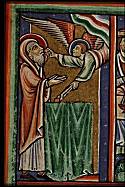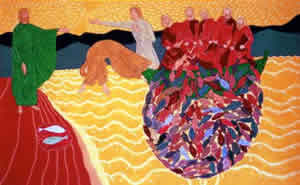Keep Marching to the End
For Sunday February 7, 2010
Lectionary Readings (Revised Common Lectionary, Year C)
Isaiah 6:1–13
Psalm 138
1 Corinthians 15:1–11
Luke 5:1–11
Next year will mark the seventy-fifth anniversary of Georges Bernanos's novel The Diary of a Country Priest (1936). If you've ever struggled with the call of God to follow Jesus the Lord, I highly recommend this little book. Bernanos tells the story of a young and earnest parish priest in rural France who feels like a total failure. From a human perspective, he's not mistaken.
The entire novel is a diary in which the priest records "the simple trivial secrets of a very ordinary kind of life." He describes with brutal honesty his doubts, loneliness, social isolation, and sense of futility. He clashes with clergy colleagues. He broods over the history of his own family dysfunction. He knows that he's physically clumsy and socially awkward. He's even repulsed by his own body due to chronic stomach pains caused by an impoverished diet that's aggravated by an inadequate salary.
 |
An angel purifies Isaiah's lips (12th century). |
Nor does the priest enjoy much satisfaction in his ministry. When he shares the gospel he sometimes feels like he's merely play-acting and parroting cliches. He feels powerless in the face of suffering and ponders the absurdity of prayer. He describes his parishioners as bored, boring, and petty. They gossip about him as a "secret drinker" and a womanizer, both of which accusations are ludicrous. Still, the priest loves his flock; he visits every home every year, and he prays for them.
The cumulative effect of this candor and introspection is a sense of disillusionment. The priest is an astute observer of the weakness, frailty and fallenness of human nature, especially his own, and as a consequence he wrestles with his sense of vocation and call. He compares his restlessness to "a hornet in a bottle." Reflecting upon his "wretched weakness," he struggles with an ominous sense of total failure, that "my best is nothing." And so he questions his call: "Am I where our Lord would have me? Twenty times a day I ask this question."
The priest might have drawn some encouragement from this week's stories about Isaiah, Paul and Peter. In all three of them we observe a singular theme. It's a theme that Saint Augustine once confessed with equal parts passion and eloquence: "Lord, what I am for you terrifies me. What I am with you consoles me. For you, I am a priest. With you, I am a Christian."
When the prophet Isaiah had a vision of Yahweh in the Jerusalem temple, dread and terror overwhelmed him: "Woe to me! I am ruined! For I am a man of unclean lips, and my eyes have seen the King, the Lord Almighty" (Isaiah 6:5). Isaiah was one of the most gifted poets in ancient history; even today people who are unfamiliar with the Bible recognize his verse in music like Handel's Messiah.
But long before Kierkegaard's famous three stages (the artistic, the ethical, and the religious), Isaiah identified the profound difference between a mere artistic genius who amazes us with cleverness and a genuine apostle who speaks an authentic word from God. The billowing smoke, thundering voices, and violent earthquake that he envisioned caused Isaiah to repudiate his literary competence. His vision reads like a science fiction horror story when an angel takes a smoldering coal from the altar with a pair of tongs and sears his lips, the very source of his poetic eloquence.
When the apostle Paul pondered how violently he had tried to exterminate the early Jesus movement, painful memories evoked feelings of deep regret: "I am the least of all the apostles and do not even deserve to be called an apostle," he wrote to the Corinthians (15:9). In seven autobiographical flashbacks on his pre-conversion life, Paul describes how he imprisoned many disciples, dragged them to Jerusalem for punishment, expended every effort to force them to blaspheme, favored the death penalty for them, and opposed the name of Jesus with all his might.1
Andrei Rublev icon of Paul, c. 1420. |
What Paul once boasted of as the best religious orthodoxy he later repudiated as the worst form of self-righteous zealotry. Given his pathologically violent predisposition, even late in his life Paul still lamented, "I am the worst of sinners" (present tense). In Paul's mind, only the "unlimited patience" of God permitted him to move beyond the inertia and regret caused by his painful memories.
When the fisherman Peter worked hard all night and caught nothing at all, but then obeyed Jesus's command to sink his nets into deeper waters, he hauled in a catch of fish that ripped his nets and nearly sunk his boat. When he realized what had happened, when he grasped the inverse relationship between the power of God and his paltry faith, he recoiled before Jesus in fear: "Lord, depart from me, for I am a sinful man!" (Luke 5:8).
Peter had other occasions to confess his faults, failures, and frailty. When he rebuked Jesus for predicting his suffering and death, Jesus called Peter "satan" (Matthew 16:23). After denying that he would deny Jesus, and then doing so three times, Peter "wept bitterly" (Luke 22:62). Decades later, Paul publicly rebuked Peter for his blatant hypocrisy in refusing to eat with ritually impure Gentiles (Galatians 2:11–13).
The upshot of these three stories is that human sin, failure, and inadequacy were not obstacles to God's call. God's message never requires a perfect messenger. Because of this, embracing rather than denying our fallenness is a path of liberation and not humiliation. It's an act of candid self-awareness and not misanthropic self-hatred.
When we embrace the disparity between the divine call and human inadequacies, we move from illusion to reality, and from self-justification to divine acceptance. If we're lucky, we enjoy the paradox of the narrow boundary between more self-awareness and less self-consciousness.
Despite the abyss between divine transcendence and human finitude, we can still offer ourselves to God like Isaiah, "Here am I, send me." Without hedging our bets or adding contingency clauses we can imitate Peter, James, John, and their companions who "pulled their boats up on shore, left everything, and followed Jesus." We can rejoice with Paul that "by the grace of God I am what I am."
To Isaiah's dread, Paul's deep regrets and painful memories, Peter's fears, and to our own deeply personal insecurities today, God whispers to us what Jesus said to Peter: "Don't be afraid" (Luke 5:10). And with the psalmist for this week we can confess: "Though I walk in the midst of trouble. . . the Lord will fulfill his purpose for me" (Psalm 138: 7–8).
 |
Peter and the Miraculous Catch of Fish, fresco by Bertrand Bahuet, 1995-1996. |
By the end of Bernanos's novel, the priest has a keen sense of history and of his own obscure role to play. His elders advise him to persevere amidst his questions: "Keep saying your lessons. Go on with your work. Keep at the little daily things that need doing, til the rest comes. Concentrate. Think of a lad at his homework, trying so hard and his tongue sticking out. That's how our Lord would have us be when he gives us up to our own strength. Little things—they don't look like much, yet they bring peace. Like wild flowers which seem to have no scent, till you get a field full of 'em."
"Keep marching to the end," they encourage him, "and try to end up quietly at the roadside without shedding your equipment." When the priest dies of stomach cancer at a young age, we realize that Bernanos has painted a portrait of a genuine saint. On his deathbed at the end of the book the priest confesses, "Does it matter? Grace is everywhere."
[1] For Paul's seven autobiographical references see Acts 9:1–2, 22:3–5, 26:9–11, 1 Corinthians 15:9–11, Galatians 1:9–11, Ephesians 3:8, and 1 Timothy 1:12–17.
For further reflection
* With whose experience do you most identify — Isaiah, Paul, or Peter?
* Consider Kierkegaard: "Whoever has learned to be anxious in the right way has learned the ultimate" (Vigilius Haufniensis, The Concept of Dread).
* See Donald McCullough, The Consolations of Imperfection; Learning to Live with Life's Limitations.
Image credits: (1) Biblical-Art.com; (2) Olga's Gallery; and (3) Perso.orange.fr.





